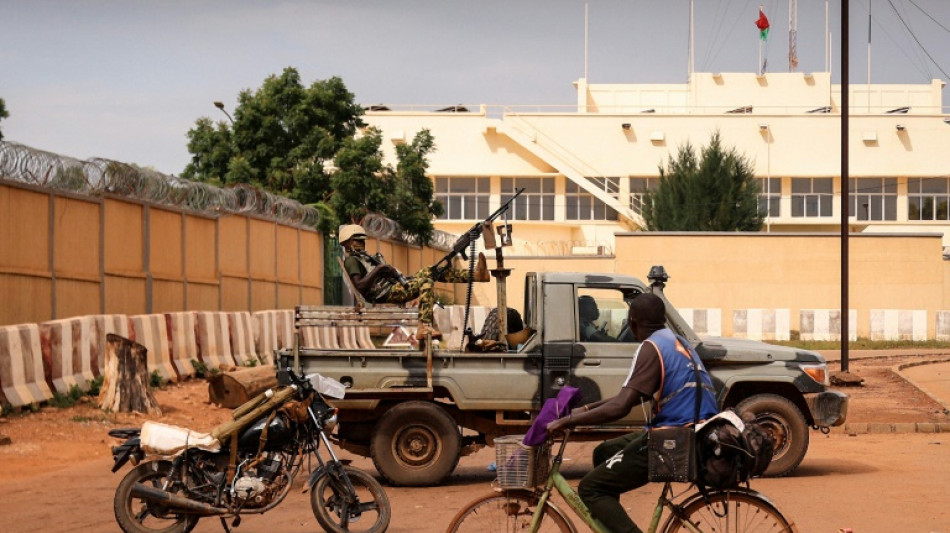
| RIO | 0.03% | 62.45 | $ | |
| CMSC | -0.18% | 24.52 | $ | |
| BTI | 0.05% | 36.95 | $ | |
| SCS | -0.38% | 13.04 | $ | |
| BCC | -0.33% | 137.729 | $ | |
| NGG | -0.69% | 63.145 | $ | |
| CMSD | -0.24% | 24.285 | $ | |
| BCE | -0.63% | 27.14 | $ | |
| RYCEF | -1.98% | 6.56 | $ | |
| GSK | -0.5% | 33.295 | $ | |
| JRI | -0.24% | 13.228 | $ | |
| RBGPF | -0.91% | 59.65 | $ | |
| BP | -0.59% | 28.92 | $ | |
| AZN | -0.69% | 63.36 | $ | |
| VOD | 0.2% | 8.938 | $ | |
| RELX | -0.89% | 44.89 | $ |

African Union condemns latest Burkina Faso coup
The African Union on Saturday condemned the "unconstitutional change of government" in Burkina Faso, a day after the second coup this year in the deeply poor and restive West African country.
Junior officers toppled a junta leader on Friday, saying he had failed to fight jihadist attacks in the country.
"The chairperson calls upon the military to immediately and totally refrain from any acts of violence or threats to the civilian population, civil liberties, human rights," the AU said in a statement, calling for the restoration of the constitutional order by July 2024.
AU chief Moussa Faki Mahamat said he was deeply concerned about the resurgence of unconstitutional ousters in the West African nation and elsewhere on the continent.
In Burkina Faso's capital, Ouagadougou, an uneasy calm reigned as soldiers in armoured vehicles and pickup trucks guarded the national television centre but traffic slowly resumed on arterial roads.
Shops slowly started reopening in the dusty and spread-out city, where pre-dawn gunfire on Friday around the presidential palace culminated in the latest coup, that drew wide condemnation.
The Economic Community of West African States regional bloc "condemned in the strongest possible terms" the latest seizure of power, calling it "inappropriate" at a time when progress was being made for a return to constitutional order by July 1, 2024.
Burkina Faso's former colonial ruler France told its citizens in Ouagadougou, believed to number between 4,000 and 5,000, to stay home, while the European Union expressed "concern" at the unfolding events.
The United States called "for a return to calm and restraint by all actors".
Just before 8:00 pm (2000 GMT) on Friday, more than a dozen soldiers in fatigues appeared on the state television and radio broadcaster to announce the removal of Lieutenant-Colonel Paul-Henri Sandaogo Damiba.
They proclaimed 34-year-old Captain Ibrahim Traore in charge.
"We have decided to take our responsibilities, driven by a single ideal: the restoration of security and integrity of our territory," they said.
"Damiba failed. Since he came to power, the zones that were peaceful were attacked. He took power but then he betrayed us," Habibata Rouamba, a trader and activist said on Saturday.
With much of the Sahel region battling a growing Islamist insurgency, the violence has prompted a series of coups in Mali, Guinea and Chad since 2020.
In January, Damiba installed himself as leader of the country of 16 million after accusing elected president Roch Marc Christian Kabore of failing to beat back the jihadists.
- Damiba accused of failure -
But with more than 40 percent of the country outside government control, the latest putsch leaders said Damiba, too, had failed.
"Far from liberating the occupied territories, the once-peaceful areas have come under terrorist control," the new military leaders said.
They then suspended the constitution, sealed the borders, dissolved the transitional government and legislative assembly and instituted a 9:00 pm to 5:00 am curfew.
New strongman Traore was previously head of anti-jihadist special forces unit "Cobra" in the northern region of Kaya.
- Junta leader's fate unclear -
Damiba's fate remains unknown.
In the morning, shots rang out in the Ouaga 2000 neighbourhood, which houses both the presidential and junta headquarters.
State television was cut for several hours prior to the military announcement, broadcasting just a blank screen with the message "no video signal".
Though Damiba had promised to make security his priority when he took charge on January 24, violent attacks have increased since March.
In the north and east, towns have been blockaded by insurgents who have blown up bridges and attacked supply convoys.
As in bordering countries, insurgents affiliated with Al-Qaeda and the Islamic State group have stoked unrest.
Thousands have died and about two million have been displaced by the fighting since 2015 when the insurgency spread to Burkina Faso, which has since become the epicentre of the violence across the Sahel.
Earlier this week, suspected jihadists attacked a convoy carrying supplies to the town of Djibo in the north of the country. The government said 11 soldiers died and around 50 civilians were missing.
D.Marques--LiLuX



